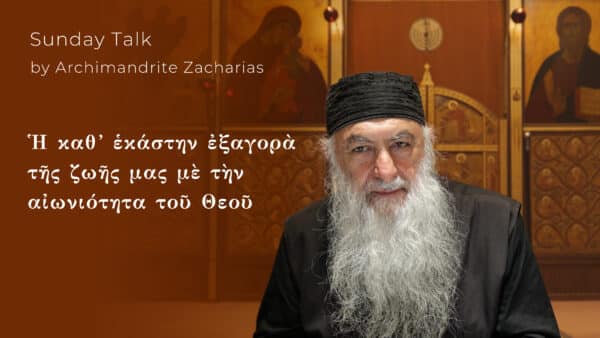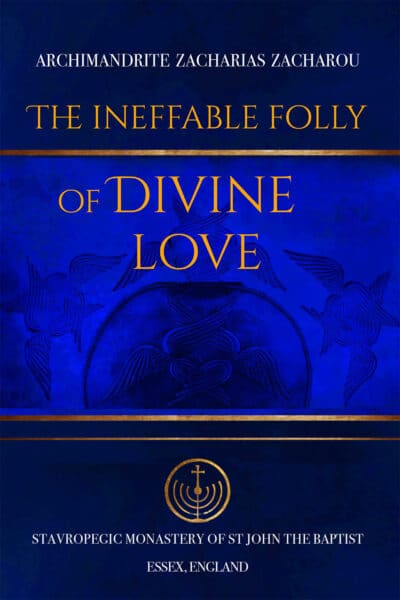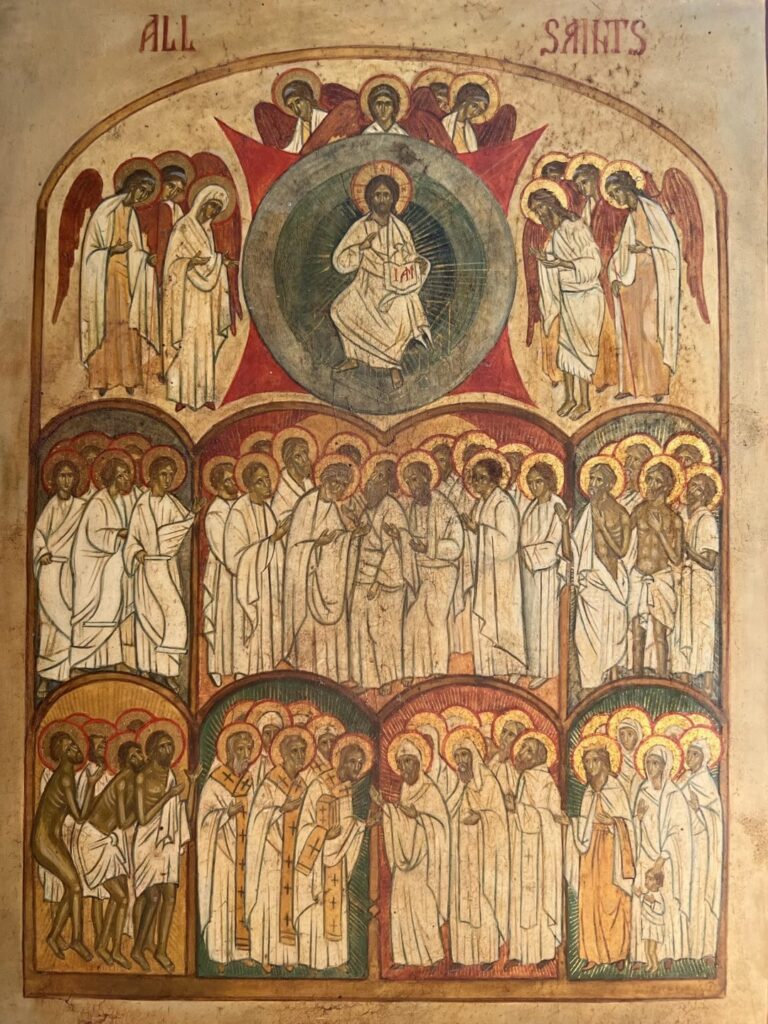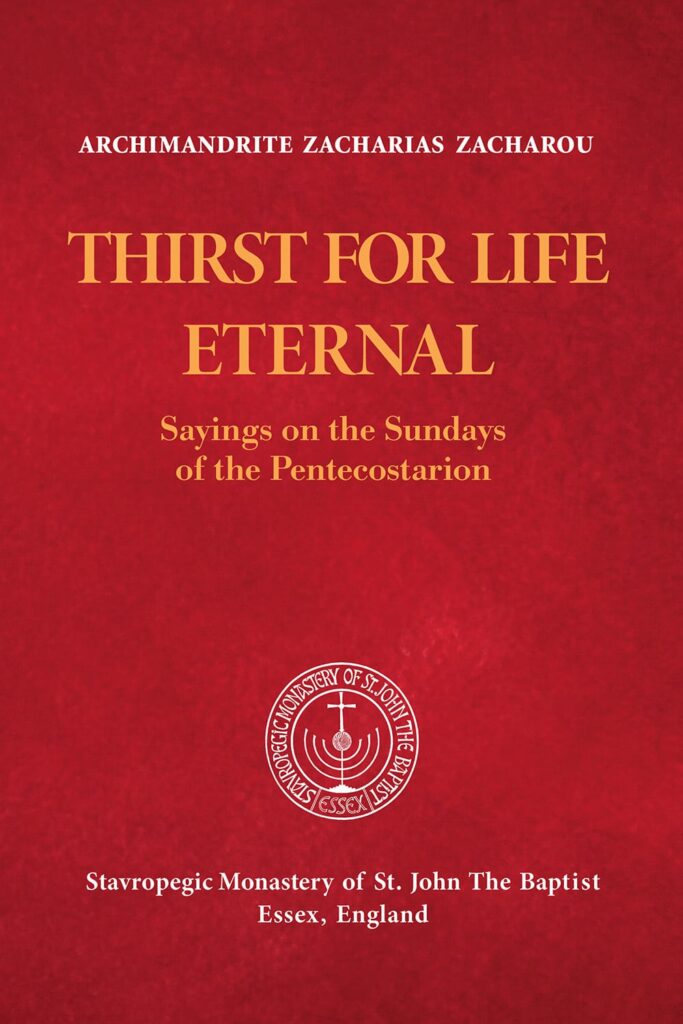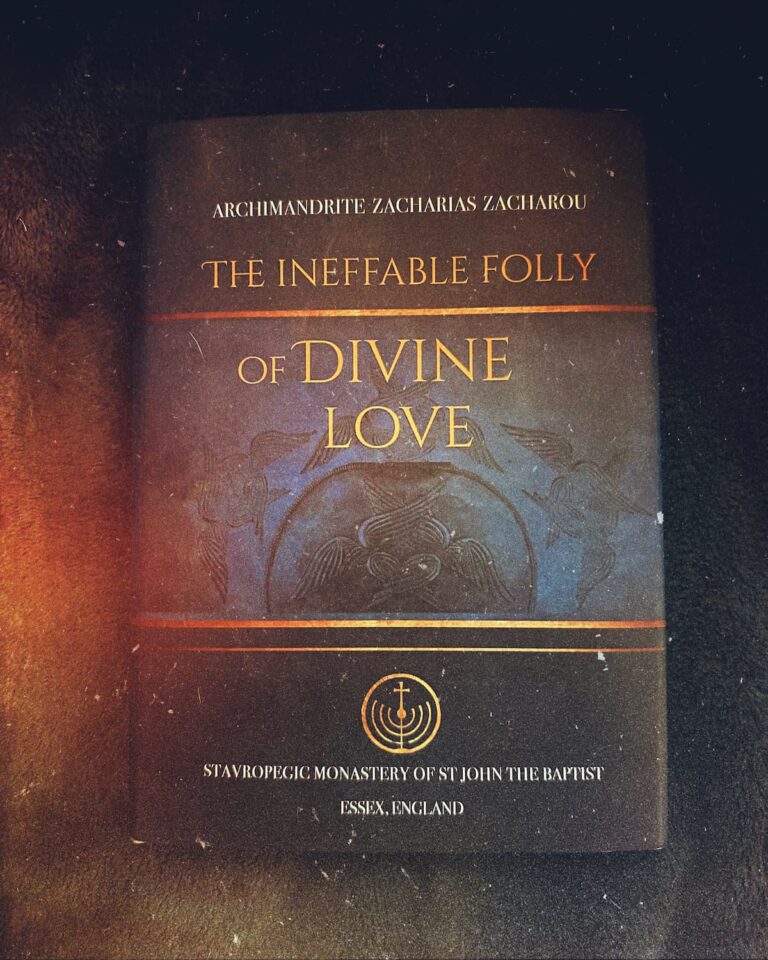God formed man with His hands from the dust of the ground. Ιn a priestly manner, He performed the mystery of Pentecost by breathing into Adam’s nostrils ‘the breath of life’, His Holy Spirit, ‘and man became a living soul’.1Gen. 2:7. However, man foolishly disobeyed the divine precept and grieved the Holy Spirit, Who could no longer remain with him, ‘for he was flesh’.2cf. Gen. 6:3. His tragic turn from the Creator towards creation deprived him of the life-giving breath of God and filled him with the alien spirit of the world. Then God the Father revealed Himself through promises of love and mercy and sent His Only-begotten Son into the world. The Son and Word of the Father came into the world and conquered sin in His own flesh; He abolished death and opened a door for the grace of the Holy Spirit to descend and transform the ‘children of wrath’ into the ‘light-bearing children of the Church’. The Holy Spirit came upon the earth to grant man a new birth from above and, being ‘divine and divinising’ (Matins of Pentecost, Lauds), to make him a ‘partaker of divine nature’32 Pet. 1:4. and sanctify him. The saints bear witness to the truth of Christ in history unto the end of time. They are the continuation of the mystery of the Incarnation of the Word that took place ‘once and for all’ in historical time but is always at work in the hearts of the faithful by the Holy Spirit. Therefore, the saints are the perpetuation of the mystery of Pentecost.
The saints cultivated the seed of His image in their hearts and bore the fruit of His likeness. That is why the truth of man’s creation in the image of God is revealed in them, as well as the potential given to man to become like unto his Creator, and contain in himself both God and the created world. The Holy Spirit is the image of the Son of God because when He dwells in the deep heart, He depicts the exceeding beautiful countenance of Christ and makes His meek voice resound like a harp.4John 5:37; 1 Cor. 14:7. But what is the image of the Holy Spirit? How is the third and secret Person of the Holy Trinity known? The saints of God throughout the ages form His images. They reflect His virtue, His humility, His love, His ethos. By their unshakeable faith and their godly suffering, the saints justify the spotless love of Christ that encompasses all things. God is well-pleased to clothe His faithful servants in a garment of holiness and to be glorified ‘in the assembly of little gods’.5Ps. 81:1 LXX. St Sophrony states that, ‘Holiness is not an ethical but an ontological concept. A man is not holy because his morals or conduct are good,’ nor because he is a great ascetic – but because ‘he bears within himself the Holy Spirit.’
The sanctification of man is the will of God61 Thess. 4:3 and it is the fulfilment of man’s pre-eternal destiny. In order to gain salvation, man must acquire traces of sanctification, even if only a few, while still in this life. Holiness is the light of life, and without it ‘no man shall see the Lord’.7Heb. 12:14. That is why both in the Bible and in ascetic terminology the two concepts of ‘sanctification’ and ‘light’ are intertwined and sometimes identified. Sanctification is the ‘garment of glory’ wherewith God endues the souls that belong to Him; it is the luminous garment of His supernatural divine otherness, of the love of Christ and of His way, which the Holy Spirit brought on earth on the day of Pentecost. Since then, sanctification has been preserved as a precious treasure within the bosom of the Church. In today’s Gospel, Christ says, ‘Whosoever therefore shall confess me before men, him will I confess also before my Father which is in heaven. But whosoever shall deny me before men, him will I also deny before my Father which is in heaven’.8Matt. 10:32-33. In essence, the Lord is speaking here of the life of holiness, of the Holy Spirit abiding in the heart of man. Already by the mouth of the prophet, God had given the promise: ‘I will dwell in them, and walk in them; and I will be their God, and they shall be my people’.9Lev. 26:12. The saints, whom we celebrate today, are the living temples of the Godhead, not made by the hands of man, where the Spirit of God is well-pleased to rest.
The confession that God requires from His own presupposes the confession of the Creed, but it is not limited to it. St Paul states that Christ made a ‘good confession’ when He testified before Pontius Pilate.101 Tim. 6:13. However, we know from the Gospels that the Lord was silent before the judgment seat of the Governor. The confession of Christ was silent, but all-powerful, so that as St John of the Ladder says, ‘the silence of Jesus put Pilate to shame’. The confession of faith, therefore, does not consist in pompous proclamations and heroic gestures, but in the indwelling of the Holy Spirit in the heart of man, by the power of which he lives, speaks, thinks and breathes with extreme humility and all-encompassing love, like the Lamb of God. He utters the word that the Holy Spirit begets in his heart. The ethos of Christ is the most convincing confession of the truth of the Lord. It is not an accomplishment to hurl fire and lightning from heaven and destroy the earth. Even the mighty men of the earth possess this power. However, an inconceivable and indescribable accomplishment is Christ’s good, creative and loving work in the world, which raises man from the abyss of his fall and the pit of perdition, which clothes the shame of his nakedness with a garment of dignity, beauty and holiness, and transforms him from a ‘child of hell’11Matt. 23:15. into ‘a child of light and of the day’12John 12:36. a beloved child of the Heavenly Father for ever and ever.
Question: What is the most precious ascetic endeavour of the monk?
Answer: The most incredible prowess of the monk and the most important virtue that he pursues is the spirit of humility because then he is a true disciple of the true Master. The Lord says: ‘Learn of me; for I am meek and lowly in heart’13Matt. 11:29. This means that we can only learn from Him if we are meek and humble in heart. Many experiences of the hermits in ‘The Sayings of the Desert Fathers’ illustrate this truth that we should not put our confidence in ourselves, but in Him Who can raise even the dead, as St Paul says.142 Cor. 1:9. If we understand this question of humility and apprenticeship to Christ, then we will surely come to realise greater things and receive the perfect bond of love with Him.
Question: Could we say that this feast of All Saints celebrates the inauguration of the Holy Church on earth?
Answer: Yes. In fact, in the feasts in the Church, the commemoration of the eternal events of the life of Christ and of all the saints of God, enables us to become through grace contemporaries of these eternal events that were performed once and remain for ever. They are the power that gives substance to life on earth and inspires all Christians to follow the example of our Lord. St Silouan says that the purpose of life on earth is to acquire the grace of God. Through His energy, love, power and all His virtues, we can experience daily these great events, Christmas, Easter, Pentecost, as always present in our life. The monk, but also every Christian who bears in himself the spirit of repentance, is an image of Pentecost. Through repentance, man continually undergoes the earthquake, the shaking of his whole being by the presence of Christ, which purifies and enlightens man. But according to the Beatitude of our Lord, after the earthquake comes the incorruptible consolation of His Spirit: ‘Blessed are they that mourn: for they shall be comforted with the incorruptible comfort of the Holy Spirit’.15Matt. 5:4. In a prophetical way, like Prophet Elijah, those who repent go through this earthquake of the Spirit which shakes off all the scales of corruption that they have accumulated in this life. They are purified and enabled to also experience the small peaceful breeze of the Holy Spirit.161 Kings. 9:12. Thus, what is important is to bear the grace of Christ, which transforms and strengthens our nature to stand in the presence of God. Then we become contemporaries of all the eternal events of God’s sacred history from the beginning of the world to the Second Coming of Christ.
Question: Must we consider the others saints?
Answer: I think this is a bit exaggerated. It sounds beautiful, but we are not on that level. Fr Sophrony told me when I became a priest: ‘Now that you have become a priest, do not look at the people that come to you as they are, but see that which lies behind them: how they can become before God in His grace.’ When we meet our fellow, if we think of the great destiny that God ordained for him, of becoming in His image and likeness, that is, another small god in the communion of the gods or saints in heaven; if we treat each person with care and reverence, it will surely be most pleasing to God. We must remember that each person comes into this world with the magnificent destiny of becoming like unto God. And the greatest good that we can do for our neighbour is to co-work with God for him to fulfil this primordial purpose which God ordained for him at his creation.
Question: The saints who are still alive, do they live on the earth with their body, while their spirit dwells with God?
Answer: Yes, exactly. Each saint differs from the others just as each star differs from the other stars.171 Cor. 15:41. It is true, the saints live both on earth and in heaven at the same time. Even in our poor measure, if we, ordinary people of whom I am the poorest, pour out our heart and weep before God to the end for our wretchedness in the night or in the morning, then all day long we will go about our work, but we will not forget that Someone is constantly present in our heart; that we belong not to this earth, but to Heaven; that we have not thrown an anchor into the sea for our ship not to be tossed by the waves, but into Heaven, from where we are pulled up continually. Speaking about those who live with spiritual mourning before God day by day, St John Climacus personifies weeping and says that when they are tempted to perform an act which is not according to the good pleasure of God, they hear a voice in their hearts which says, ‘If you do this, I will abandon you.’ Weeping is a serious form of repentance and brings such a consolation to man, that when he only thinks of deviating from that practice, he hears this voice from the personified gift of God in his heart. Then, he who has tasted of the way of tears, replies to God, ‘For the sake of Thy commandments, I will keep to the hard path that Thou hast commanded us, the narrow way which Thou hast prescribed for us’.18Ps. 17:4; Matt. 7:14.
Question: You said that the spiritual mourning is personified. Does this mean that if man perseveres in mourning, he becomes a hypostasis and is also aware of the Hypostasis of God present in him?
Answer: If he perseveres in this way of life, he will receive the gift of pure prayer. He will be detached from everything corruptible in this world and attached to the Spirit of God. And he who cleaves to this Spirit, becomes ‘one spirit with the Lord’.191 Cor. 6:17. Pure prayer means that man speaks to God face to Face, person to Person, and he can ‘hear His voice and even see His kind’,20John 15:37 like the apostles and the saints of all centuries. We belong to the ‘one, holy, catholic and apostolic Church’ with an unbroken tradition from the time of Christ to this day, for the experience of the apostles and the saints is always present in the Church of God and always offered to the faithful. Life in our Church is so wonderful: God ‘treats’ us continually with His love. It is enough to think that in every Liturgy He gives His life to us, His enemies. The faithful who partake of the Holy Gifts with a pure conscience, experience precisely the power of this indestructible life, which is in the bosom of the Church and is given freely to her members. God does not need our sacrifices. He is in need of nothing. Yet, He wants us to show some sense of honour and prepare a place for His habitation in us. I know many Christians who pray continually with one short petition: ‘Lord, make me Thine for ever,’ until they convince God that they are His. Then they hear in their hearts: ‘Yes, thou art my son. This day have I begotten thee. All that I have is thine.’ From then on, it is not they that labour, but the grace of God in them.
Question: Why did Christ need to have a Forerunner?
Answer: He did not only have the Forerunner. From the moment we fell into sin, God undertook an incredible work of love, His Providence, in order to bring us back to Him and bring salvation on earth. Through the transgression in Paradise, we lost the vision of God, and we could no longer delight in His presence like Adam and Eve in the beginning. Our nature was desolate, deprived of every strength to bear things divine. God could no longer approach us directly, for His presence was now unbearable to us. Therefore, God devised ways and began a long sacred history, sending righteous and prophets to this world, speaking in parables and proverbs, giving instructions, promises and commandments in order to bring us to a certain understanding so as to follow the injunctions of God. St Philaret of Moscow says that like man is blinded if he looks straight at the sun, but his eyes can bear its reflection in the water of a lake, in the same way, He came to the earth and spoke to us in parables. He did not show us His glory as He did on mount Tabor, when Peter, James and John fell on their face, unable to bear the brightness of the Face of Christ. Instead, there was a whole education, through dreams and visions, through parables and proverbs, to prepare people to receive the coming of our Lord Jesus Christ.
When the Lord came and spoke to them, truly honouring them and teaching them how to please God, they said that His words are hard, who can bear hearing them?21John 6:60. Even His disciples, although they were fascinated at the gifts He bestowed upon them to raise the dead, heal the sick, cast out the demons and the like, even they could not comprehend that He Who stood before them was the Personal God of the Revelation Who said to Moses, ‘I Am that I Am.’ Yet, the Lord ‘made the good confession’221 Tim. 6:12. through His Cross and Resurrection, and brought victory in His very Flesh, which He then left to us as an inheritance. Now, if we are wise and prepare ourselves as well as we can, He will make up for what we lack so that we may partake of His Body and Blood and achieve the perfect union with Christ, Who saved us by His love to the end. Until now, the Holy Church of God travails to educate us and prepare us for the perfect meeting with our Lord, as we see it in the Righteous Simeon the God-receiver. Simeon was a man ‘just and devout’23Luke 2:25 and dedicated his life to live by the ordinances of God. Therefore, when he took Christ in his arms, he called Him ‘the glory of His people Israel’24Luke 2:32 and was accounted worthy to perceive even in a Babe the Creator and Saviour of the whole universe. The Church strives to prepare us to receive a little gift, which will attach us more solidly to the Body of the Church and lead us into the communion of the saints, which contains all the gifts of the Holy Spirit. We are not expected to have them all; we are expected to acquire be it a small gift of the Holy Spirit, but to show seriously our fidelity to God and our gratitude for what He has done for us. Then we become true members of this visible Body on earth which, in the Liturgy, is united with the invisible Body of God in heaven. In this lies the perfection of the great salvation that our Lord Jesus Christ brought to earth.
Question: What is the true meaning of sin? A holy Elder once said that there is a difference between sin and transgression.
Answer: Often, when we examine the etymology of a term, we receive a theological understanding. The Greek word for ‘sin’ is ἀμαρτία (amartía), and the verb ‘to sin’ is ἀμαρτάνω (amartanō), which means ‘to miss the target’. For all men, there should be one target: God Himself. When he deviates from this target and chooses other things as targets, he begins to sin. Thus, sin is to deviate from the way that has God as a target. For as long as our target is God, we will do everything to please Him until we unite perfectly with Him. Whereas when we deviate from this target, we betray our own ingratitude. If God did not spare even His Only-begotten Son but delivered Him unto death for the salvation of the world ‘that whosoever believeth in Him should not perish, but have everlasting life’;25John 3:16. if God gave us all things in His Christ, and we neglect such a gift, it is a crime against His love: ingratitude is the greatest sin. We often hear that all sin comes from pride, and ingratitude is a form of pride.
There is only one sin, ingratitude, and we show this ingratitude through all our transgressions. It is ingratitude that makes us deviate from our target, which should be only God. Conversely, that which most pleases the Lord is thanksgiving. When we are grateful and continually give rightful thanksgiving to God, it means that we recognise that all the things we have are the gift of God, that we have received them on loan from Him. ‘Now if thou didst receive it, why dost thou glory, as if thou hadst not received it?’, says the apostle.261 Cor. 4:7. We cannot boast in the gift; our duty is to give thanks, for we owe gratitude to the Giver. We have received our life on loan, we must render it back brightened and sanctified as the Holy Gospel demands. We must remember that all things in our life are the gift of God; we must show a certain fidelity and offer God rightful thanksgiving and a life pleasing to Him.
Footnotes
- 1Gen. 2:7.
- 2cf. Gen. 6:3.
- 32 Pet. 1:4.
- 4John 5:37; 1 Cor. 14:7.
- 5Ps. 81:1 LXX.
- 61 Thess. 4:3
- 7Heb. 12:14.
- 8Matt. 10:32-33.
- 9Lev. 26:12.
- 101 Tim. 6:13.
- 11Matt. 23:15.
- 12John 12:36.
- 13Matt. 11:29.
- 142 Cor. 1:9.
- 15Matt. 5:4.
- 161 Kings. 9:12.
- 171 Cor. 15:41.
- 18Ps. 17:4; Matt. 7:14.
- 191 Cor. 6:17.
- 20John 15:37
- 21John 6:60.
- 221 Tim. 6:12.
- 23Luke 2:25
- 24Luke 2:32
- 25John 3:16.
- 261 Cor. 4:7.
